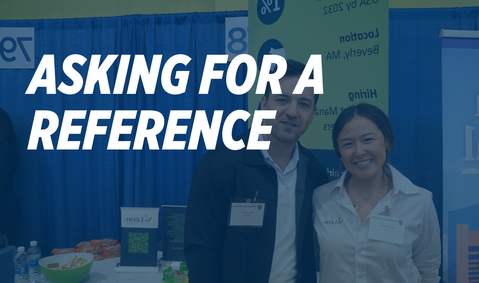Asking for a Reference
A typical part of an internship/job search is being asked to provide your references. You may also hear about it as a request for a letter of recommendation in certain situations.
References and recommendations can be a deciding factor on whether you’re the final candidate in a search process. You should spend time thinking about who would make the right reference / recommendation for you. These tips are here to support you in making the right decision.
- A recommendation is a statement of approval and support. They are typically written by someone who knows you in an academic or professional setting, who can vouch for qualifications and skills you have for a new position. These statements highlight the strengths you have as an applicant.
- A reference is someone who can speak to your qualifications as an applicant. Typically a reference check is completed via phone but may be collected in a written format.
- Recommendations and references are often required during a job application process so employers can learn more about you as a candidate and about your past work experience.
- Think about your past and current supervisors, co-workers, co-volunteers, teachers and mentors and academic advisors. You want to avoid listing parents, family members or significant others.
- You are looking for people who can speak to your abilities and qualifications that would match the jobs you are applying for.
- In some cases you may want to use different references depending on the job you are applying for, and who you feel will be best to speak to your qualifications for each job.
- This means the bigger your possible reference lists are, the easier this will be for you. A typical application will ask for 1-3 references.
- These are great people to be connected with on LinkedIn and if you aren’t already, you should do so during this part of the process.
- Schedule a short meeting in person, on Zoom or a phone call, to ask if this person would be willing to be a positive reference for you.
- If they say yes, discuss the types of positions you are applying for and the qualifications needed to obtain those roles. This way, you are ensuring you and your reference are on the same page about your qualifications.
- Thank them for being a reference – this is something extra they are doing to help you!
- Make sure you have their correct contact information – both a phone number and an email address.
- Offer them a copy of your resume and cover letter you will be submitting to specific positions.
- While some positions may require you to submit your references in a document format – this list can also support you in maintaining the contact information of each of your references long term.
- It should be in the same format and font as your resume using the same header. Think of all of your documents being part of one big packet and they all should look the same.
- Keep them all posted when you have applied for positions and when you have interviews arranged.
- If you hear from the employer that they will be checking your references, make sure to let them know when they should be expecting outreach. They will appreciate the advanced notice.
- Make sure to thank your references after they complete your recommendation. You can ask them if there was anything they were asked they didn’t have an answer to and provide them with the additional context if you’re still actively applying for more roles.
- If you receive an offer to join the employer, make sure to reach out again to your references and let them know.


